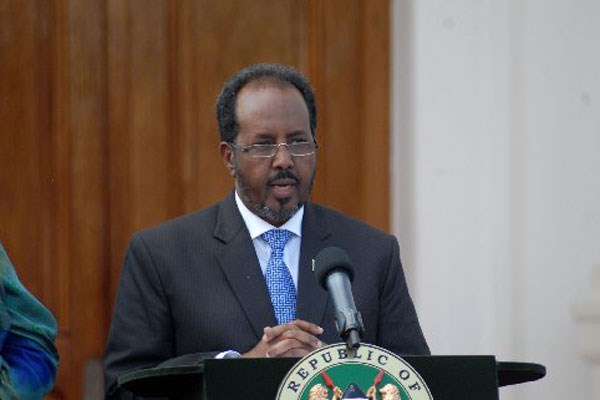
By ABDULKADIR KHALIF
Thursday, September 22, 2016

Somali President Hassan Sheikh Mohamoud. The war-torn country is gradually embracing democracy. FILE PHOTO | SALATON NJAU | NATION MEDIA GROUP
MOGADISHU
On August 9, the National Leadership Forum (NLF) unveiled the modalities for this year’s elections in Somalia.
Since then, the restive nation has become awash with the election sing-song.
NLF is a coalition of leaders that includes the Federal President Hassan Sheikh Mohamoud, the Speaker of the Parliament Mohamed Osman Jawari, the Prime Minister and his deputy and the leaders of the regional authorities of Puntland, Jubaland, Southwest and Galmudug.
The leaders endorsed an electoral plan proposed by an independent 22-member commission, chaired by legal expert Omar Mohamoud Abdulle. The commission had set an election timetable.
“The commission urges the public to support the process by being security vigilantes during the election period,” remarked Mr Abdulle.
According to the modalities, Somalia is set to have a parliament with a 54-member Upper House and a 275-member Lower House, also known as the people’s hall. The Upper House must be ready by September 25.
The state members of the Federal Republic such as Puntland, Galmudug, Southwest and Jubaland will choose the members to the Upper House.
The selection of the people’s hall legislators will take place between September 24 and October 10, with each MP being elected by 51 voters in accordance with the stipulated conditions.
The voters will be selected by 135 traditional clan leaders chosen under a power sharing formula known as 4.5, which means that each one of the four major Somali clans, namely Darood, Hawiye, Digil/Mirifle and Dir, will have equal representation.
Both the members of the Lower and Upper houses will be sworn in on October 20, and will be expected to elect the respective speakers and their deputies on October 25.
SIGH OF RELIEF
The greatest attention, however, is on the October 30 date when the combined legislators of the Upper and Lower houses are scheduled to elect a president.
Several individuals have so far expressed their wish to occupy Villa Somalia, the state house in Mogadishu, with the incumbent repeatedly declaring his determination to recapture the seat.
Generally, there was a sigh of relief that Somalia was gradually embracing democracy after two decades of dictatorship under General Mohamed Siad Barre and two decades of civil war. One indicator was the fact that many had come up to challenge President Mohamoud.
The aspirants include include Prime Minister Omar Abdirashid Sharmarke and Mr Abdurahman Mohamed Farole, the former leader of the semi-autonomous state of Puntland.
Dr Sharmarke, 61, declared his candidacy on September 5 and underlined that his main mission would be to revive the economy and restore peace by eliminating the influence of the Al-Qaeda linked Al-Shabaab from all Somali zones.
“If elected, I will revive the country’s economy and establish a strong army to restore peace,” he said.
The 72-year-old Farole has served Puntland in various capacities, including as Finance minister. He is a member of the unregistered Horseed Party.
Mr Farole says he hopes to eliminate the clan power sharing formula known as 4.5 (four point five).
The Mogadishu residents were familiar with the rallying calls by Mr Abdirahaman Abdishakur Warsame, a former minister during the Transitional Federal Government.